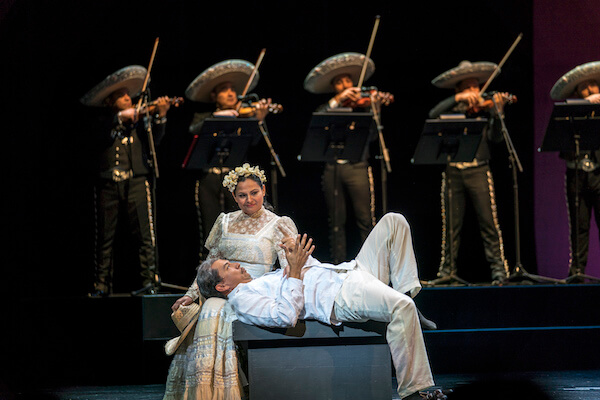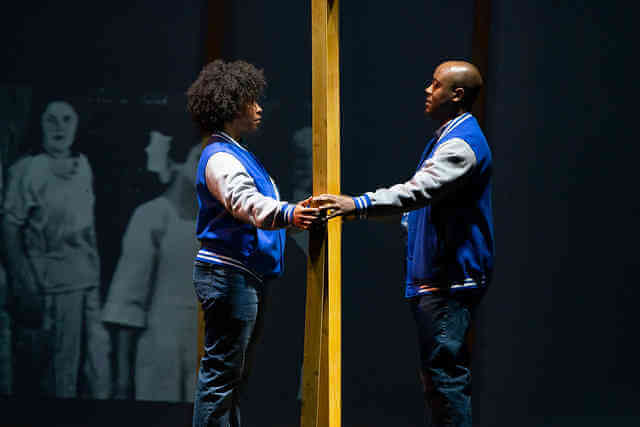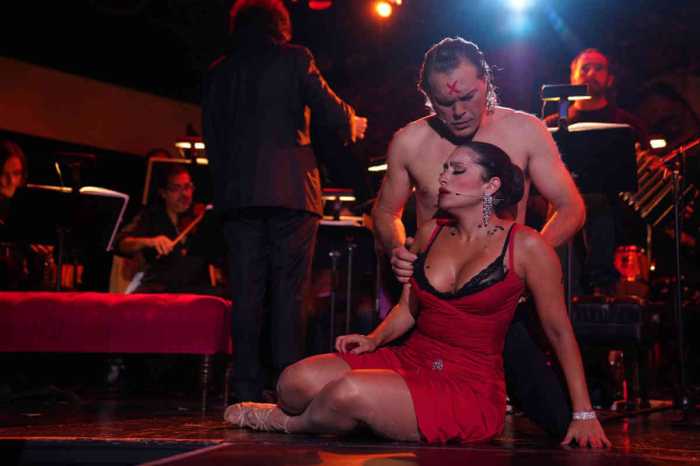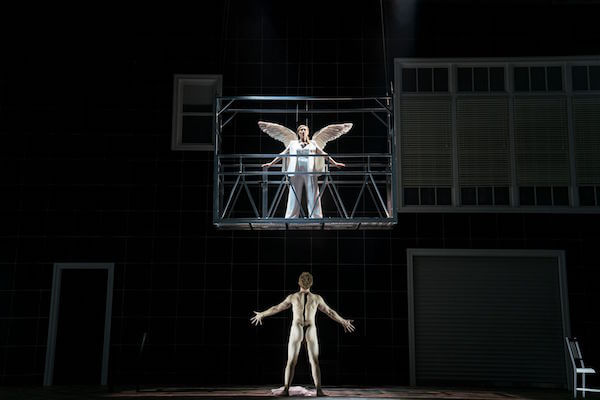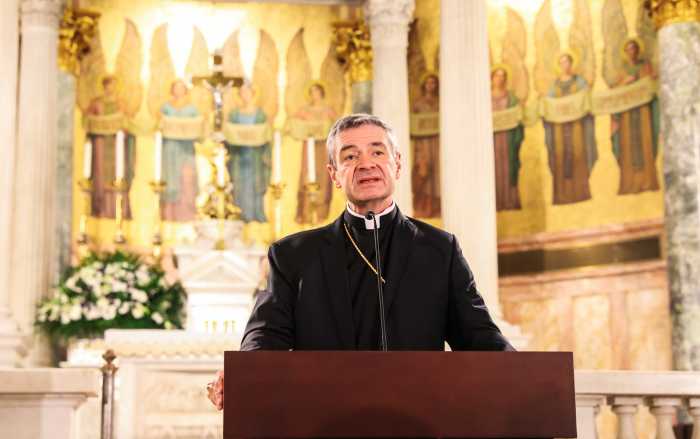Cecilia Duarte and Octavio MOreno in New York City Opera's production of José (Pepe) Martínez’s “Cruzar la Cara de la Luna.” | SARAH SHATZ
Opera critics have a tendency to be finicky in matters concerning musical genre. Houston Grand Opera commissioned a “mariachi opera” from composer José (Pepe) Martínez set to a bilingual libretto by director Leonard Foglia. “Cruzar la Cara de la Luna,” which had its world premiere in Houston in 2010, is more mariachi than classical in musical style. It is better described as musical theater or folk operetta in form – there is considerable spoken dialogue that advances the story.
Does that matter? Not at all.
First of all, Martínez composes mariachi music that is unashamedly tuneful and romantic in style: the emotions are big and the melodies soaring. Mariachi shares common musical DNA with zarzuela, South American popular canción, and Southwestern swing music. The piece has loads of heart that it wears on its sleeve, and the tearjerker story has become decidedly more topical in this new age of Trump immigration policy, DACA under fire, and “bad hombres.” In late January, New York City Opera brought the original Houston production to the Rose Theater at Jazz at Lincoln Center for four performances as part of its Ópera en Español series.
NYCO brings José (Pepe) Martínez’s “Cruzar la Cara de la Luna” from Houston Grand Opera
Foglia’s libretto tells the ripped-from-the-headlines story of the undocumented Mexican immigrant Laurentino Velásquez and his fractured family. Laurentino is torn between two countries and two cultures — the son he left behind in Mexico to follow his dream of success in America and his second family born in the United States. The action starts in New York City as Laurentino (Octavio Moreno) is facing the end of his life tortured by memories of his first wife Renata (Cecilia Duarte) and their son Rafael (portrayed as an adult by tenor Daniel Montenegro). Renata died in the desert trying to cross the Mexico border to join her husband, and their son Rafael was brought up by Renata’s relatives. Rafael has not seen or spoken to his father since the death of his mother when he was a small boy. Laurentino’s second son Mark (Efrain Solís) and his granddaughter Diana (Maria Valdes) are attempting to locate the elusive Rafael in Mexico to reunite him with his estranged father.
The title of the opera (which translates as “Crossing the Face of the Moon”) refers to the migration of monarch butterflies from North America across the desert to the small Mexican village where Laurentino and Renata grew up. The butterflies return to Mexico every year, a poetic symbol Foglia employs to mirror the journey of this Mexican immigrant from his “home” where he wishes to return at the end of his life.
Foglia’s production (borrowed from Houston Grand Opera) initially is set in a gritty present day New York City with minimal props and stage furniture in front of a dark downstage scrim. When the story flashes back to Mexico five decades earlier, the scrim lifts and the stage is flooded with light and color. The members of Mariachi Los Camperos appear dressed in traditional charro outfits with sombreros on bandstands before a panoramic backdrop of the Mexican sky. This coup de theatre elicited a big ovation. The Mariachi Los Camperos serves as the opera orchestra living up to its great fame and reputation with vivid and authentic music-making.
The cast comes from varied musical backgrounds, ranging from pure mariachi (Vanessa Alonzo as Renata’s earthy practical friend Lupita) to classical (the gifted Daniel Montenegro) to crossover artists like mezzo-soprano Cecilia Duarte who sings everything from Mozart to jazz. Many of these singers created their roles in Houston and have toured the opera across the country to Arizona, Chicago, Fort Worth, and San Diego and for its European premiere at Théâtre du Châtelet in Paris in 2011. All of them brought great emotional urgency and sincerity to a simple story that could be seen as sentimental and emotionally manipulative but which earned our tears played with integrity, sweetness, and emotional truth.
Foglia’s minimal but effective production keeps the action moving with the singers very much in the forefront of the action. This is an intimate story about people, but the wide open spaces of the Mexican landscape are vividly evoked. Foglia’s libretto and direction gives humanity and dignity to the Mexican and Mexican-American characters, and Martínez’s music gives them heart and soul.
New York City Opera general director Michael Capasso said it best: “At a time when our country’s debate on immigration and national identity has reached fever pitch, ‘Cruzar la Cara de la Luna’ gives human dimension to the stories of those among us whose lives are too often reduced to mere talking points. City Opera is privileged to present this unique work which exemplifies the power of theater to make us better understand ourselves and each other.”

